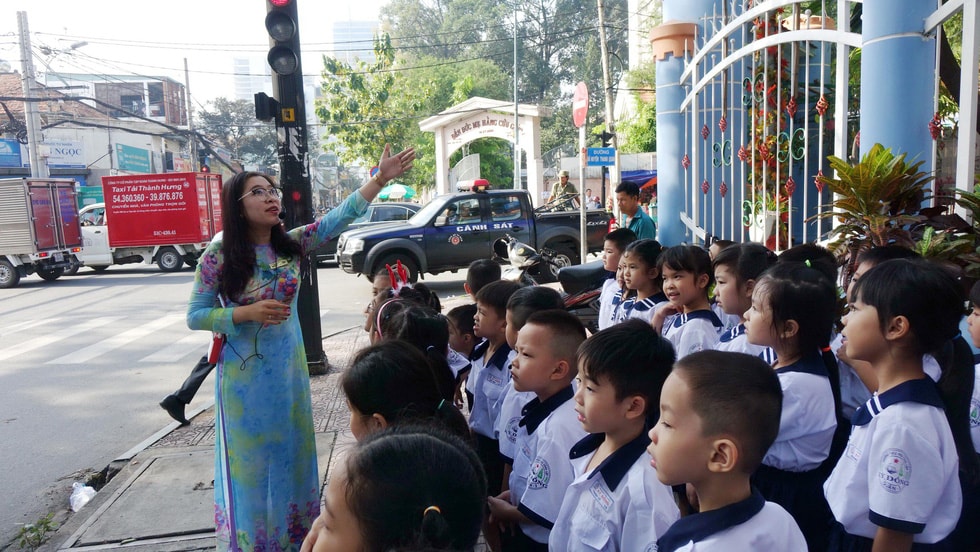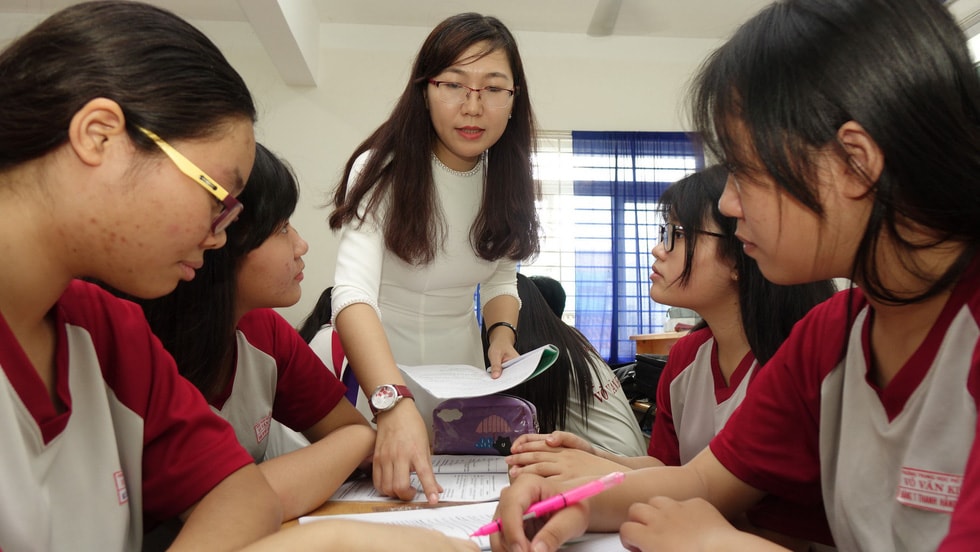New curriculum: Students do not have to memorize, but learn how to spend money
The Ministry of Education and Training is about to announce a new curriculum, according to which students will be taught web design, how to spend money... Especially, they will no longer have to memorize literature and history...
 |
| Students of Ky Dong Primary School, District 3, Ho Chi Minh City in an after-school lesson learning about Traffic Laws. Photo: Nhu Hung |
There are only 6 works included in the compulsory literature program: The poem "God", "Hich tuong si", "Binh Ngo dai cao", "Truyen Kieu", "Van te nghi si Can Giuoc" and "Declaration of Independence".
Professor Nguyen Minh Thuyet, editor-in-chief of the new general education program, had an interview on the occasion of this event.
GrandfatherTheorysaid: nLooking back at the three educational reforms in 1950, 1956 and 1979, there is one similarity: there was no curriculum, only textbooks.
The 2000 curriculum and textbook innovation had a curriculum built. But there was no overall curriculum, but it was divided by grade level. Each grade levelis a separate project.
When the 2005 Education Law was issued, the Ministry of Education and Training required linking the three programs of the three levels together and building knowledge and skills standards, transcribed from the written textbooks.
This is also the cause of some problems such as duplicated or contradictory knowledge, and lack of consistency.between levels of education.
* So this time, will that problem be fixed?
- This time, the Ministry of Education and Training has approved a comprehensive general education program from grade 1 to grade 12. This program is legally normative, publicly announced and consulted according to the correct procedure, issued by the Minister of Education and Training according to a circular.
The subject programs to be announced are compiled according to the overall program to ensure consistency, connectivity, suitability for students of all levels and ensure the general orientation of the program.
All are aimed at developing learners' capacity and qualities; creating conditions for schools and teachers to be proactive and creative in choosing textbooks, materials and building teaching plans.

Professor Nguyen Minh Thuyet. Photo: N.Khanh
Literature: focuses on listening, speaking, reading and writing skills* Will the new literature program eliminate many classic works, such as Nam Cao's Chi Pheo?
- The new Vietnamese language/literature program is built in an open direction, without detailed regulations on teaching content and specific texts, but focuses on the requirements for reading, writing, speaking and listening for each class.
There will be only 6 works included in the compulsory program, which are poems.God, Proclamation to the Soldiers, Proclamation of Victory over the Wu, Tale of Kieu, Funeral Oration for the Martyrs of Can GiuocandDeclaration of IndependenceOther literary works are included in the appendix.
Textbook author groups can proactively choose different works to include in textbooks, but all aim to use the materials to develop competencies.qualities for students
* So when implementing the new program, the exams must also change?
- That's right. Previously, the literature exam was limited to a number of literary works in the textbooks. But when the exam aims to test the learner's ability and qualities, not the content of memorized knowledge, candidates can completely use different materials to meet the requirements.exam requirements
The literature program will focus on developing reading comprehension methods, text creation, practice, application of different text types, and presentation methods, in order to develop learners' communication and aesthetic abilities.
In the subject requirements, the drafting group also set out the minimum teaching conditions that in addition to textbooks, schools need to have reference bookshelves with many types of books, including all texts from literary works to informational texts.

Graphics: Vi Cuong
Reduce rote learningand academic knowledge* What are the notable new points in other subjects, according to the professor?
- Some subjects, in my opinion, have had stronger and more reasonable changes. For example, history in primary school will mainly teach stories, with themes close to life. This is also the design direction of natural & social subjects and history & geography in primary school.
At the secondary level, the history subject will teach general history according to the historical process. But the difference compared to before is that Vietnamese history will be placed in world history at each stage, not separated.
In high school, history will be taught in depth. Memorization and learning of data and events will be significantly reduced, focusing only on lessons.study, historical significance.
Art subjects currently include music, fine arts, and crafts, but in the future they will be expanded to the applied arts. In particular, high school will branch out to teach fashion design, graphics, web design, and crafts...
Natural science subjects will be designed in an applied direction, linked to real life and closely following the nature of the subject. Knowledge that is too difficult and academic will be omitted.
* How are the experiential activities - which received mixed opinions when contributing to the program - being adjusted?
- Previously, the design experience activity was rigid, divided into 9 themes for 9 months associated with events and holidays taking place during the month, but now it has been adjusted more flexibly.
This activity is divided into 4 contents: personal development activities; labor activities; social and volunteer activities; career guidance activities.Time for experiential activities, in addition to the weekly flag-raising ceremony and class activities, will include specialized lessons and extracurricular activities (8 lessons/month).
However, schools should proactively design this activity, it is not necessary to divide it into weeks but can combine all 8 periods in 1-2 months to organize specialized activities in 1 session or 1 day.
* According to the professor, for the program to be feasible, what factors need to be focused on preparing?
- First of all is teacher training. Besides, one thing that needs to be done is to give the initiative to the schools, at least the initiative in building teaching plans. However, along with the initiative, there must be tight responsibility.
Another important point is to reform the examination. Without changes in testing, assessment and examination, it will be difficult to implement this program.
Not completed foreign language program
Up to this point, only foreign language has not completed its curriculum, and it may be announced in the second phase. The other subjects have been completed. After the announcement, the Ministry of Education and Training will officially announce the invitation for individuals and organizations to participate in writing textbooks for the new curriculum.
Teach students how to spend money and obey the law

Teachers and students of class 12A5 at Vo Van Kiet High School, District 8, Ho Chi Minh City during a civics class. Photo: Nhu Hung
* How will ethics and civics change in the new curriculum?
- We use the old name for the subject, but the content of the subject has been strongly adjusted. In primary school, ethics focuses on educating behavior and skills. In secondary school, we focus on educating civic responsibility and law.
High school education focuses on law and economics. Previously, there was a plan to have an economics subject, but later we integrated it into civics and other subjects, throughout all levels of education.
Financial education for high school students, in our opinion, is very important in the current context. Students need to be educated on how to manage, how to spend money, the awareness of saving, and how to use money in the most useful way...
On the other hand, up to high school level, with the orientation of promoting practicality, the group of occupations related to administration, law, economics, police, and military do not have specific subjects for students to choose in depth like other groups. Therefore, supplementing knowledge of economics and law in civic education and other subjects is very necessary for students who want to pursue this group of occupations.
